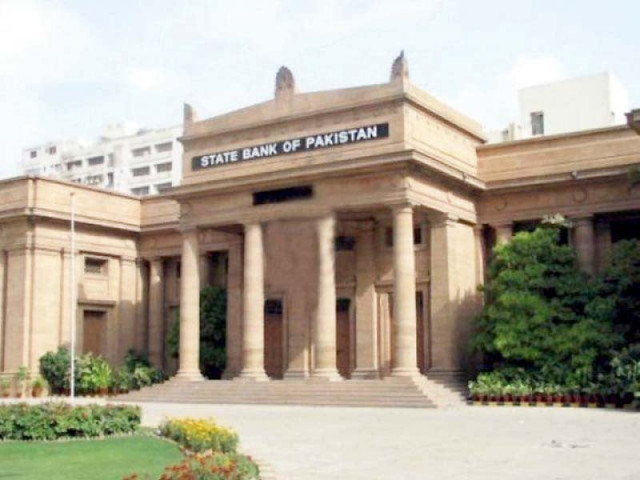SBP keeps interest rate at 7%
MPC revises growth forecast to 3% due to recovery in manufacturing sector

The State Bank of Pakistan (SBP) on Friday kept the interest rate unchanged at 7%, attributing the recent spike in inflation to government’s decision to increase electricity tariffs and uncontrolled wheat and sugar prices.
The monetary policy announcement came hours before the federal government increased the minimum support price for wheat by 28.5% to Rs1,800 per 40 kilogramme.
Prime Minister Imran Khan agreed to increase the support price after the centre and Sindh government could not break impasse over the wheat price for the new crop.
While leaving the key policy rate unchanged, the Monetary Policy Committee (MPC) revised upward the economic growth forecast to 3% because of recovery in the manufacturing sector.
It said that inflation would remain close to 9% - well above the official target of 6.5% - in the current fiscal year. MPC decided to maintain the policy rate at 7%, according to a statement issued by the central bank after the meeting.
“While still modest, at around 3%, growth in fiscal year is now projected to be higher than previously anticipated due to improved prospects for manufacturing and reflecting in part the monetary and fiscal stimulus provided during Covid,” said the central bank.
MPC noted that since the last meeting in January, growth and employment had continued to recover and business sentiment further improved.
It added that the recent inflation out-turns had been volatile, with the lowest reading on headline inflation in more than two years in January 2021 followed by a sharp rise in February.
According to SBP estimates, the recent increase in electricity tariffs and sugar and wheat prices accounts for about one-and-a-half percentage point of the three-percentage-point increase in inflation between the January and February out-turns, the central bank underlined.
The Pakistan Tehreek-e-Insaf (PTI) government has failed to arrest a continued surge in wheat and sugar prices, thanks to its wrong decision of first exporting both the commodities and then importing them.
The federal government on Friday rushed to increase the wheat support price to Rs1,800 per 40 kg after Sindh fixed the price at Rs2,000.
This year, the government expects 26.25 million tons of wheat production, which is short of the country’s annual consumption requirement.
“The government has decided to import three million tons of wheat this year,” said Federal Minister for National Food Security and Research Syed Fakhr Imam.
It will be the second successive year when Pakistan will import wheat to meet its domestic requirement.
The SBP said that the recent increase in electricity prices would continue to manifest in headline inflation numbers in the coming months, keeping average inflation in the current fiscal year close to the upper end of the previously announced range of 7-9%.
The SBP said that the recent increase in inflation was primarily due to supply-side factors, but added that core inflation continued to be relatively subdued.
“Inflation expectations - while drifting up somewhat due to the recent increase in headline inflation numbers - are still well-anchored,” it added.
For the medium term, the central bank hoped that the temporary increase in inflation from administered prices would wane and the pace would slow down to 5-7%. MPC said that the existing accommodative stance of monetary policy was appropriate to support the recovery while keeping inflation expectations well-anchored and maintaining financial stability.
The SBP said that summer’s wage negotiations and any new tax measures in next year’s budget could add further supply-side shocks.
The headline inflation may continue to remain elevated in the coming months due to administered prices and base effects, underlying price pressures from the demand side or second-round effects should remain contained. MPC would monitor these developments carefully and react to them appropriately when needed, said the SBP.
MPC expects monetary policy settings to remain broadly unchanged in the near term as the recovery becomes more durable and the economy returns to full capacity.
“The MPC expects any adjustments in the policy rate to be measured and gradual to achieve mildly positive real interest rates.”
However, compared to the core inflation, the real interest rate is still positive. It said that fiscal policy was expected to remain contractionary to reduce public debt therefore, it was important for monetary policy to be supportive as long as secondround effects of recent increases in administered prices and other oneoff supply shocks do not materialise and inflation expectations remain well anchored.
The central bank said that despite the recent growth momentum, risks remain due to the emergence of a third, more virulent wave of Covid-19 in Pakistan just as the vaccine roll-out was beginning.
On the external front, the central bank said that the trade deficit was widening somewhat on the back of imports of capital goods and industrial materials as well as food, together with rising international commodity prices.



















COMMENTS
Comments are moderated and generally will be posted if they are on-topic and not abusive.
For more information, please see our Comments FAQ